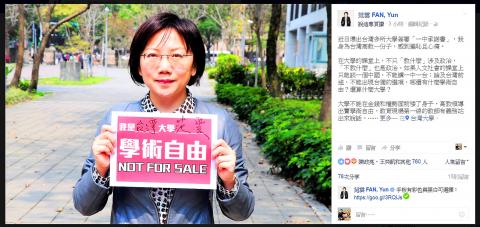A Taiwanese professor on Sunday launched a petition to protect academic freedom following allegations last week that a majority of the nation’s universities signed letters agreeing to censor topics Beijing deems offensive.
Shih Hsin University on Thursday last week was accused of signing a letter promising Chinese universities that its faculty would not discuss sensitive political topics in classes offered to Chinese exchange students, such as “one China, one Taiwan,” “two Chinas” and Taiwanese independence.
The Ministry of Education said a preliminary investigation revealed that at least 80 Taiwanese universities have signed similar agreements and that a full investigation is to be conducted in the next two weeks.

Photo: screengrab from Facebook
Fan Yun (范雲), a National Taiwan University sociology professor and the Social Democratic Party (SDP) convener, called on professors to petition against political restrictions imposed on them by universities.
“As a teacher in Taiwanese higher education, I feel ashamed and heartbroken. In a university classroom, what one teaches and refrains from teaching are both political actions. If humanities education … is obliged to negate Taiwanese independence in discussions about Taiwan’s future, we have no such thing as academic freedom in universities,” she said on Facebook.
Fan said the scandal is a “crisis of Taiwanese democracy,” adding that universities have a duty to safeguard academic discourse and research freedoms, but the incident shows that half the nation’s institutions are prepared to sacrifice those principles.
“There is no such thing as apolitical academic discourse. Marking any topic as beyond the pale of learning or discussion is in itself politically manipulative,” she said, adding that universities that do not honor academic freedom are “no better than counterfeit food products.”
A number of university faculties and student organizations have participated in Fan’s movement by signing the petition and posting photographs displaying their names, institutions and the message “academic freedom is not for sale.”
Former Shih Hsin University president Lai Ting-ming (賴鼎銘) and professor Chen Cheng-liang (陳政亮), have signed the petition.
The National Taiwan University Student Association and the National Taiwan University Graduate Student Association issued a joint statement condemning the agreements, saying that they compromise academic freedom, limit exchange students learning experience and destroy the integrity of cross-strait academic exchanges.
“Academic freedom is a right guaranteed by the University Act (大學法) and should not be abridged because university administrators are afraid of China,” they said.
Resurrecting censorship on campus is offensive to the democracy advocates and dissidents who died during the Martial Law era, they added.

Chinese spouse and influencer Guan Guan’s (關關) residency permit has been revoked for repeatedly posting pro-China videos that threaten national security, the National Immigration Agency confirmed today. Guan Guan has said many controversial statements in her videos posted to Douyin (抖音), including “the red flag will soon be painted all over Taiwan” and “Taiwan is an inseparable part of China,” and expressing hope for expedited reunification. The agency last year received multiple reports alleging that Guan Guan had advocated for armed reunification. After verifying the reports, the agency last month issued a notice requiring her to appear and explain her actions. Guan

GIVE AND TAKE: Blood demand continues to rise each year, while fewer young donors are available due to the nation’s falling birthrate, a doctor said Blood donors can redeem points earned from donations to obtain limited edition Formosan black bear travel mugs, the Kaohsiung Blood Center said yesterday, as it announced a goal of stocking 20,000 units of blood prior to the Lunar New Year. The last month of the lunar year is National Blood Donation Month, when local centers seek to stockpile blood for use during the Lunar New Year holiday. The blood demand in southern Taiwan — including Tainan and Kaohsiung, as well as Chiayi, Pingtung, Penghu and Taitung counties — is about 2,000 units per day, the center said. The donation campaign aims to boost

The Kaohsiung Tourism Bureau audited six hotels in an effort to prevent price gouging ahead of Korean band BTS’ concert tour in the city scheduled for Nov. 19, 21 and 22 this year. The bureau on Friday said that the audits — conducted in response to allegations of unfair pricing posted on social media — found no wrongdoing. These establishments included the local branches of Chateau de Chine, Hotel Nikko, My Humble House, and Grand Hai Lai, it said, adding that the Consumer Protection Commission would have penalized price gougers had the accusations been substantiated. The bureau said the Tourism Development Act

BACK TO WINTER: A strong continental cold air mass would move south on Tuesday next week, bringing colder temperatures to northern and central Taiwan A tropical depression east of the Philippines could soon be upgraded to be the first tropical storm of this year, the Central Weather Administration (CWA) said yesterday, adding that the next cold air mass is forecast to arrive on Monday next week. CWA forecaster Cheng Jie-ren (鄭傑仁) said the first tropical depression of this year is over waters east of the Philippines, about 1,867km southeast of Oluanpi (鵝鑾鼻), and could strengthen into Tropical Storm Nokaen by early today. The system is moving slowly from northwest to north, and is expected to remain east of the Philippines with little chance of affecting Taiwan,